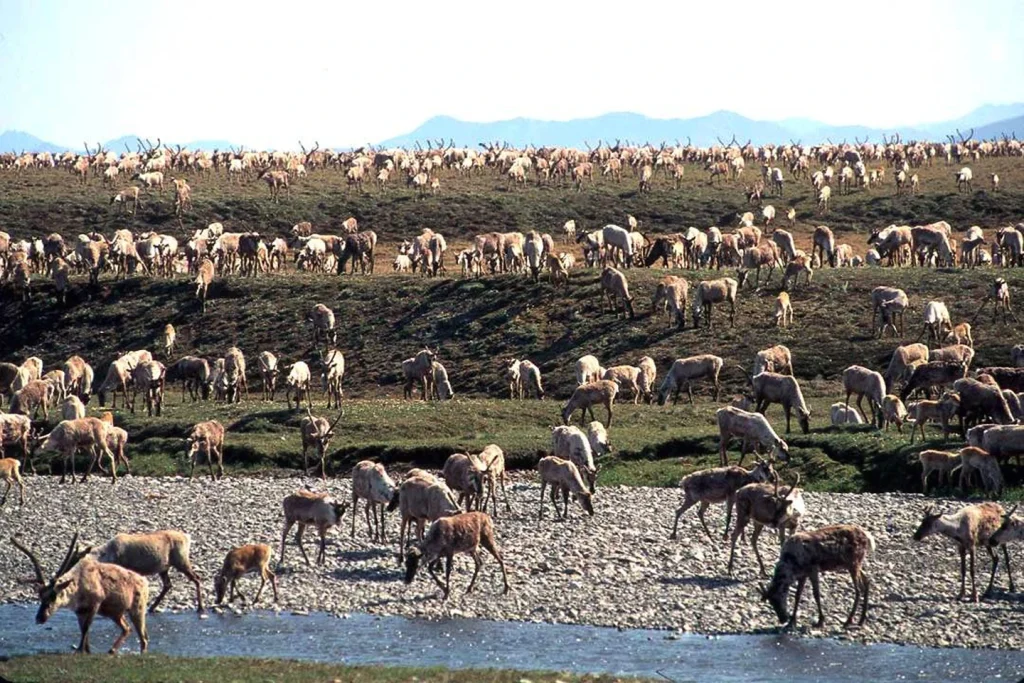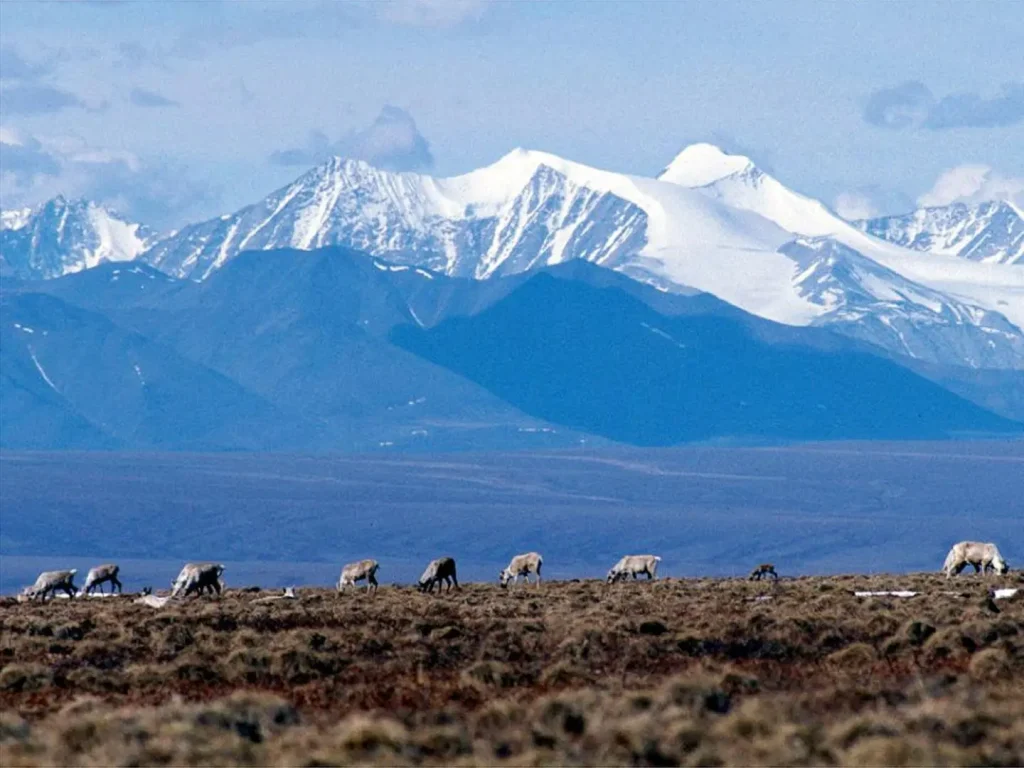The Biden administration has taken a bold and contentious step by revoking the seven remaining oil and gas leases in Alaska’s Arctic National Wildlife Refuge, a move that has sparked anger among Republicans.
These leases were originally granted during the final days of the Trump administration, and their cancellation marks a clear departure from the previous administration’s stance on energy development.
Additionally, the Department of Interior has proposed stronger protections against development in the National Petroleum Reserve-Alaska, a decision that has further fueled the controversy surrounding the administration’s approach to energy policy.
Earlier this year, the Biden administration faced criticism from environmental groups for approving the Willow oil project, a massive undertaking by ConocoPhillips Alaska that could potentially yield up to 180,000 barrels of oil per day on the petroleum-rich North Slope of Alaska.
To address these concerns, the administration has now proposed protective measures for over 20,000 square miles of land in the western Arctic, a move that has been welcomed by some critics.
However, they argue that more needs to be done to combat climate change. Notably, litigation over the approval of the Willow project is still pending, adding another layer of complexity to the ongoing debate surrounding energy development in Alaska.
In a statement, President Biden emphasized the significance of Alaska as a repository of America’s most awe-inspiring natural wonders and culturally important sites.
With the climate crisis posing a severe threat to the Arctic, where temperatures are rising at a rate more than twice that of the global average, it becomes imperative for us to take on the responsibility of safeguarding this cherished region for generations to come.
Alaska’s pristine landscapes and unique biodiversity are not only a source of national pride but also hold immense value in terms of ecological balance and cultural heritage.

Recognizing the urgent need for action, President Biden’s words underscore the commitment to preserving this remarkable part of our nation’s heritage.
By prioritizing protection and conservation efforts in Alaska, we can contribute to the collective responsibility of mitigating climate change and ensuring the longevity of these natural wonders for all ages.
President Biden expressed that the actions taken by his administration are a direct response to the pressing issue of the climate crisis.
With a sense of urgency, these actions are aimed at safeguarding our lands and waters for future generations.
By acknowledging the gravity of the situation, Biden demonstrates his commitment to addressing the environmental challenges that our planet faces.
This commitment is not only essential for the well-being of our natural resources, but also for the overall sustainability and prosperity of our society.
By taking proactive measures, Biden’s administration is paving the way for a more sustainable future, where the impacts of climate change are mitigated, and the beauty and diversity of our natural world are preserved.
These actions not only reflect a responsible and forward-thinking approach, but also serve as a testament to the importance of global cooperation in tackling the climate crisis.
As we navigate these uncertain times, it is crucial that world leaders prioritize the protection and conservation of our environment, and Biden’s commitment to this cause sets a positive example for others to follow.
In response to President Biden’s actions, the Republican governor of Alaska expressed strong disapproval and even threatened to take legal action.
Conversely, a Democratic lawmaker voiced concerns over the potential negative impact on Indigenous communities residing in a remote area heavily reliant on oil development as a vital economic driver.
Interior Secretary Deb Haaland, who faced criticism for her involvement in approving the Willow project, asserted on Wednesday that drilling for oil would not be permitted in one of the world’s most delicate landscapes.
However, a law enacted in 2017 mandates another lease sale to be held by late 2024, and the current administration intends to adhere to this legal requirement.
Furthermore, the Biden administration unveiled proposed regulations aimed at providing enhanced safeguards against new leasing and development within specific sections of the National Petroleum Reserve-Alaska, which have been designated as special areas due to their ecological, subsistence, scenic, or other intrinsic values.
These proposed rules will undergo a public comment period before being finalized. Notably, the Willow project is situated within the reserve, but it is not anticipated to be impacted by the aforementioned proposed regulations.
The Arctic National Wildlife Refuge’s coastal plain, encompassing an expansive 1.5-million-acre area along the Beaufort Sea in Alaska’s northeastern region, holds immense significance for the Indigenous Gwich’in community.
This stretch of land serves as a sacred site where caribou, vital to their way of life, migrate and give birth.
Characterized by its undulating hills, meandering rivers, small lakes, and tundra, the coastal plain serves as a crucial migratory route for birds and caribou, while also providing a habitat for diverse wildlife, including polar bears and wolves.
Over the years, Alaska’s political leaders, including some Democrats, have been persistent in their pursuit to allow oil and gas drilling in the refuge.
Their rationale stems, in part, from the economic benefits such activities would bring to Indigenous communities in an area where alternative job opportunities are scarce.
Consequently, these voices also urged President Biden to approve the Willow project, citing similar economic advantages for the local communities.
Expressing her dismay, U.S. Representative Mary Peltola, a Democrat, lamented the reversal of leases in ANWR, as the Arctic National Wildlife Refuge is commonly referred to.
Peltola emphasized that the approval of the Willow Project by the current administration demonstrated their willingness to listen to the concerns of Alaskans.
She further highlighted that this decision disproportionately impacts the Inupiat North Slope communities, who are deeply affected by the outcome.
Peltola pledged to continue advocating for these communities and for Alaska’s ability to explore and develop its natural resources.
In 2017, Alaska’s congressional delegation succeeded in incorporating language into a federal tax law that mandated the U.S. government to conduct two lease sales in the region by the end of 2024.
However, opponents of drilling called on Congress to repeal this leasing provision from the 2017 law and permanently designate the coastal plain as off-limits to any drilling activities.
Their plea underscores the urgency and importance of preserving this ecologically significant region for future generations.
The recent announcements regarding Arctic conservation have been hailed as a monumental step forward by Jamie Williams, the president of the Wilderness Society.
With the Arctic Refuge now free of oil leases, the implications for our climate are significant, and there is a renewed sense of hope for the preservation of one of America’s last remaining wild landscapes. However, not everyone shares this sentiment, as Alaska Republican U.S. Sen. Dan Sullivan views President Biden’s actions as yet another attack on his state.
It is worth noting that two leases that were part of the initial sale in January 2021 had already been relinquished by the small companies holding them due to legal disputes and uncertainty surrounding the drilling program.
President Biden wasted no time in issuing an executive order upon taking office, calling for a temporary moratorium on leasing activities and ordering a review of the program by the Interior secretary.
Secretary Haaland subsequently conducted a new environmental review, citing multiple legal deficiencies in the previous leasing program.
As a result, all activities related to the leasing program were put on hold until the completion of the new analysis.

Finally, after much anticipation, a draft environmental review was released on Wednesday, marking a crucial milestone in the ongoing efforts to protect the Arctic Refuge.
The Alaska Industrial Development and Export Authority (AIDEA), a state corporation, recently filed a lawsuit against the moratorium imposed by the Interior Department.
However, a federal judge has recently ruled that the delay in conducting a new review by the Interior Department was not unreasonable.
AIDEA had acquired the leases in order to safeguard drilling rights in the event that oil companies did not come forward.
Interestingly, major oil companies abstained from participating in the sale, which was held subsequent to prominent banks announcing their refusal to finance Arctic oil and gas projects.
Expressing her gratitude for the lease cancellation, Bernadette Demientieff, the executive director of the Gwich’in Steering Committee, acknowledged the administration’s decision.
However, she emphasized that the temporary protection of their sacred land from oil and gas development is not a permanent solution.
In a statement, she urged the administration and Congress to repeal the oil and gas program and ensure the lasting preservation of the Arctic Refuge.
